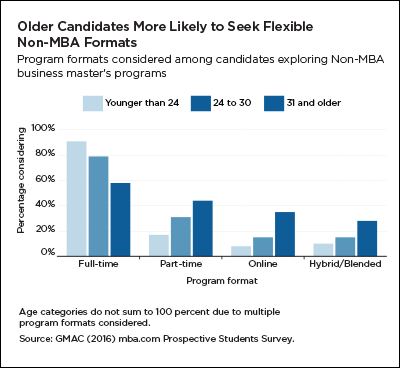Though the growth of non-MBA business master’s programs has been driven largely by younger candidates, schools may find niche opportunities with flexible options for older candidates.

One of the most significant trends in graduate business education in the past 10 years has been the growing demand for non-MBA business master’s programs. In GMAT testing year 2007, just 14 percent of all GMAT score reports were sent to non-MBA programs. In GMAT testing year 2016, that figure more than doubled to 32 percent. This growth in demand has been chiefly driven by younger candidates interested in studying on a full-time basis, according to data from the
2016 mba.com Prospective Students Survey. These findings also show, however, that older candidates are driving demand for non-MBA programs, especially for flexible program formats, and at a higher rate than their younger counterparts.
Overall, most candidates considering non-MBA program types want to study on a full-time basis (84%). This format preference varies notably by age, however. Full-time programs are considered by 91 percent of candidates younger than 24, 79 percent of candidates aged 24 to 30, and 58 percent of candidates aged 31 and older. Among candidates 31 and older, nearly half consider part-time programs (44%), and about a third consider online (35%) and hybrid (28%) programs. Though the applicant pool for non-MBA business master’s programs is overwhelmingly young—89 percent are 30 years of age or younger and only 11 percent are 31 and older—the data suggests that schools may find niche opportunities with flexible program format options for older candidates.

For more on candidate program preferences and demographics, download the 2016 mba.com Prospective Students Survey Report at gmac.com/prospectivestudents.